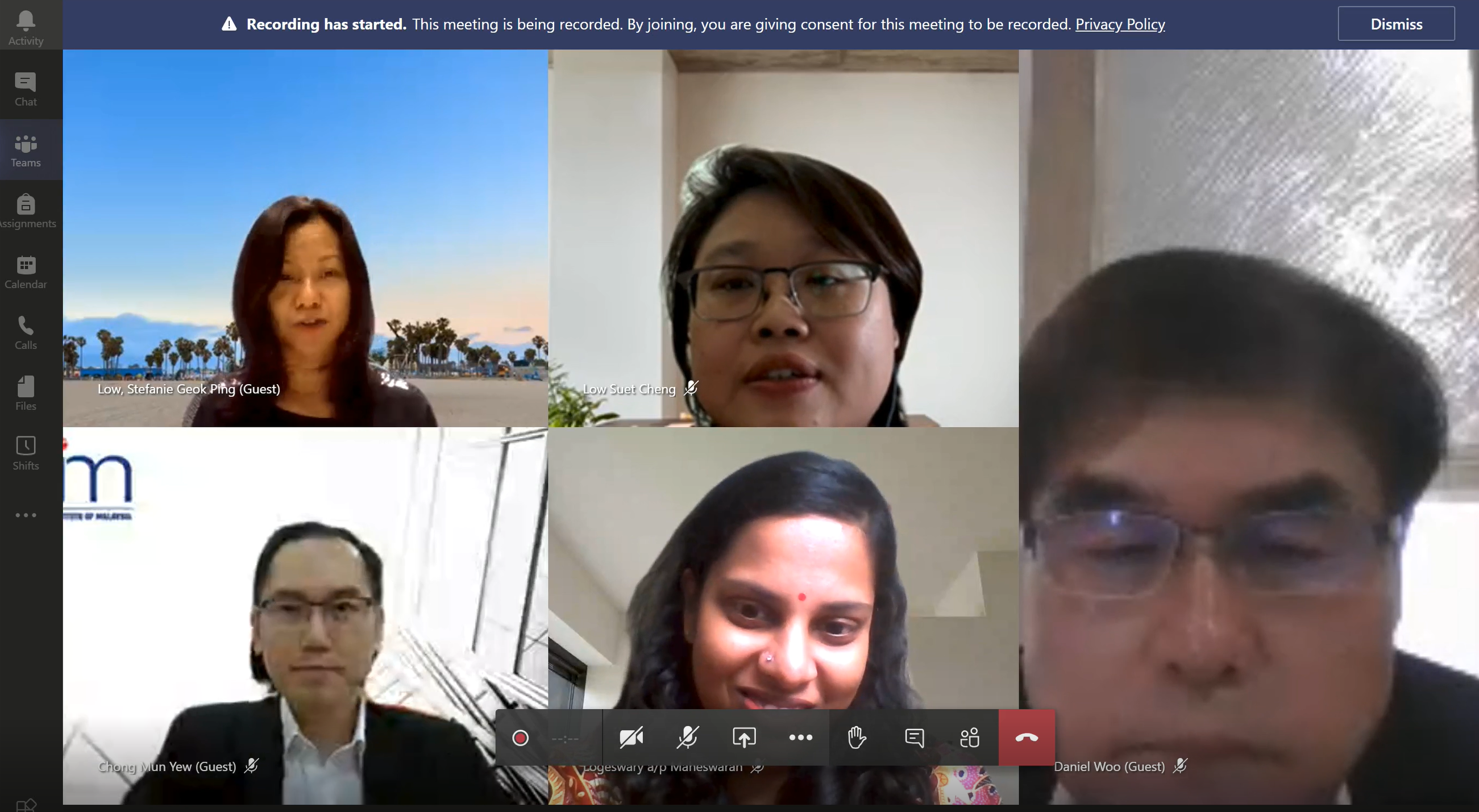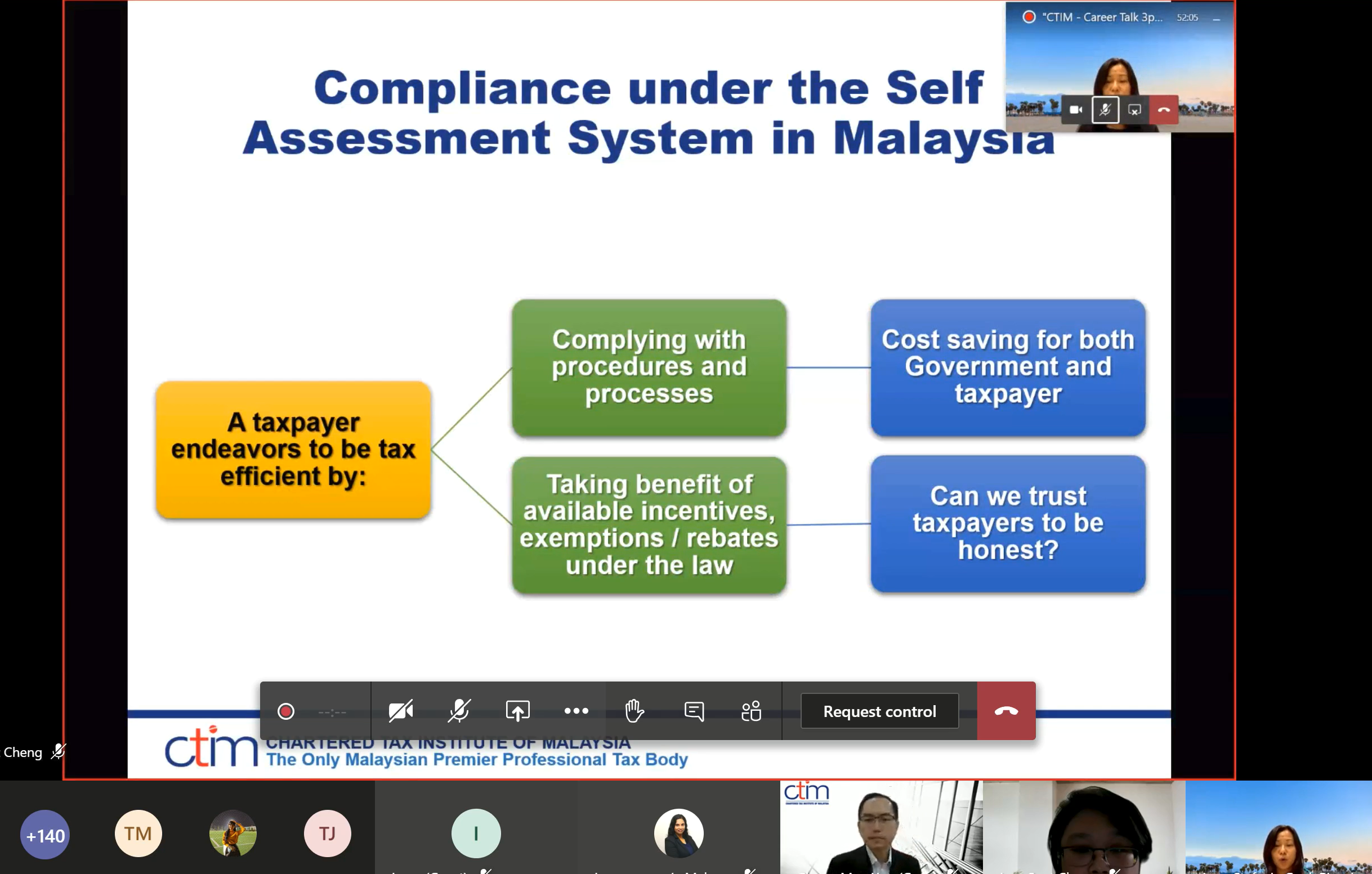

Low (top left),
Chong (bottom left) and Woo (far right) during the webinar
The Chartered Tax Institute of
Malaysia (CTIM) held a webinar on tax education career talk for more than
150 UTAR Accounting and Economics
undergraduate students as well as lecturers on 4 November 2020 via Microsoft
Teams.
Speaking at the webinar were CTIM
Chairman of the Education Committee-cum-Deloitte Tax Services Sdn Bhd
Executive Director Stefanie Low, CTIM Chairman of the Examinations
Committee-cum-Crowe KL Tax Sdn Bhd Executive Director Chong Mun Yew and
Member of the Education Committee-cum-Grant Thorton Malaysia Executive
Director Daniel Woo.
In “Taxation as a Career”, Low
spoke about the basic concept of taxation, types of taxes, the differences
between tax planning, tax avoidance and tax evasion, compliance under the
self-assessment system in Malaysia and the overview of CTIM as well as its
activities to support the profession in taxation.
“Taxation is an income to the government. The taxes collected allow for redistribution of wealth in different areas such as welfare, education, defence, transport, infrastructure and others. Tax is a financial charge exacted under the legislative authority and failure to pay is punishable by law. Indirect tax is known as consumption tax whereby in Malaysia, we have sales tax and service tax. Direct tax involves around income tax, real property gains tax and stamp duty. Taxpayers are allowed to plan their transactions in a legal manner to find the best outcome for themselves,” said Low.

Low sharing the
self-assessment system in Malaysia
She added, “When you consider
taxation as a career, bear in mind, taxation is not something you do in
isolation. To be an effective tax professional, you will need to understand
the transaction or the business itself. Apart from that, it is also
important to understand the mechanic of income and expenses before applying
the tax law to the situation. At the same time, you will also develop
critical thinking skills by doing taxation. Some of the areas of
opportunities in taxation are such as tax advisory, transfer pricing, global
employer services, international tax, tax audit and investigation, indirect
tax and incentives.”
Chong explained the CTIM
qualification and exam whereby CITM conducts professional taxation
examination in Malaysia and it is held bi-annually in June and December. In
his session, he spoke about the intermediate papers, final papers and the
paper exemptions. He said, “The intermediate papers are such as personal
taxation, economics, financial accounting, business taxation while the final
papers are revenue law, company and business law, advance taxation. The
scope we cover is wider so that you have a strong foundation in theory.”

Chong explaining
the exemption of papers according to the qualifications
Meanwhile, Woo who shared his 20
years of experience in tax profession said, “Generally, the qualifications
to embark in tax is to have a bachelor degree in either business, finance,
economics or law. However, a non-financial degree is also possible if you
have an interest in tax. Tax profession is a rewarding and fulfilling career
if you have a passion for it. It is important to have a strong foundation in
tax compliance to build a successful career.”
“Ranks vary depending on the
accounting firm that you are joining. Larger firms tend to have more levels
compared to mid-size firms. Most importantly, you have to be hardworking,
willing to learn and apply your tax knowledge to your work, it won’t take
long to become a manager in about four to five years. Do act in your
clients’ best interest by applying the right tax principles and law while
avoiding to be in a position that may create a conflict of interest. Bring
tax reforms to the country’s tax system by contributing your tax knowledge,
experience with your peers, business community and to the tax authorities,”
he said while explaining the progression in the tax profession.
The webinar was followed by a Q&A
session among participants and the speakers.
Wholly owned by UTAR Education Foundation Co. No. 578227-M LEGAL STATEMENT TERM OF USAGE PRIVACY NOTICE